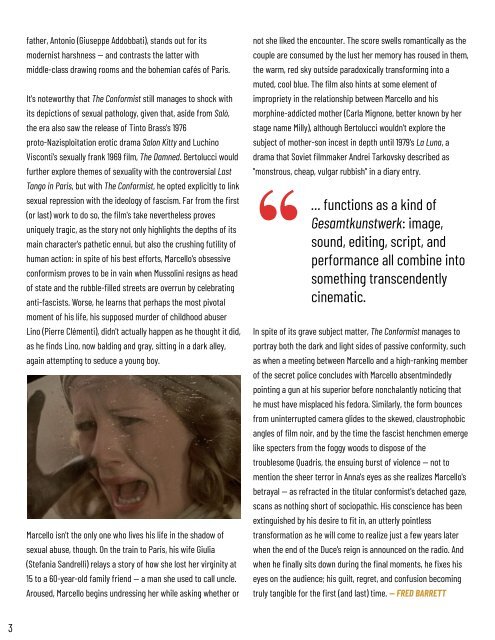InRO Weekly — Volume 1, Issue 1
Create successful ePaper yourself
Turn your PDF publications into a flip-book with our unique Google optimized e-Paper software.
father, Antonio (Giuseppe Addobbati), stands out for its<br />
modernist harshness <strong>—</strong> and contrasts the latter with<br />
middle-class drawing rooms and the bohemian cafés of Paris.<br />
It's noteworthy that The Conformist still manages to shock with<br />
its depictions of sexual pathology, given that, aside from Salò,<br />
the era also saw the release of Tinto Brass's 1976<br />
proto-Nazisploitation erotic drama Salon Kitty and Luchino<br />
Visconti's sexually frank 1969 film, The Damned. Bertolucci would<br />
further explore themes of sexuality with the controversial Last<br />
Tango in Paris, but with The Conformist, he opted explicitly to link<br />
sexual repression with the ideology of fascism. Far from the first<br />
(or last) work to do so, the film's take nevertheless proves<br />
uniquely tragic, as the story not only highlights the depths of its<br />
main character's pathetic ennui, but also the crushing futility of<br />
human action: in spite of his best efforts, Marcello's obsessive<br />
conformism proves to be in vain when Mussolini resigns as head<br />
of state and the rubble-filled streets are overrun by celebrating<br />
anti-fascists. Worse, he learns that perhaps the most pivotal<br />
moment of his life, his supposed murder of childhood abuser<br />
Lino (Pierre Clémenti), didn't actually happen as he thought it did,<br />
as he finds Lino, now balding and gray, sitting in a dark alley,<br />
again attempting to seduce a young boy.<br />
Marcello isn't the only one who lives his life in the shadow of<br />
sexual abuse, though. On the train to Paris, his wife Giulia<br />
(Stefania Sandrelli) relays a story of how she lost her virginity at<br />
15 to a 60-year-old family friend <strong>—</strong> a man she used to call uncle.<br />
Aroused, Marcello begins undressing her while asking whether or<br />
not she liked the encounter. The score swells romantically as the<br />
couple are consumed by the lust her memory has roused in them,<br />
the warm, red sky outside paradoxically transforming into a<br />
muted, cool blue. The film also hints at some element of<br />
impropriety in the relationship between Marcello and his<br />
morphine-addicted mother (Carla Mignone, better known by her<br />
stage name Milly), although Bertolucci wouldn't explore the<br />
subject of mother-son incest in depth until 1979's La Luna, a<br />
drama that Soviet filmmaker Andrei Tarkovsky described as<br />
"monstrous, cheap, vulgar rubbish" in a diary entry.<br />
“… functions as a kind of<br />
Gesamtkunstwerk: image,<br />
sound, editing, script, and<br />
performance all combine into<br />
something transcendently<br />
cinematic.<br />
In spite of its grave subject matter, The Conformist manages to<br />
portray both the dark and light sides of passive conformity, such<br />
as when a meeting between Marcello and a high-ranking member<br />
of the secret police concludes with Marcello absentmindedly<br />
pointing a gun at his superior before nonchalantly noticing that<br />
he must have misplaced his fedora. Similarly, the form bounces<br />
from uninterrupted camera glides to the skewed, claustrophobic<br />
angles of film noir, and by the time the fascist henchmen emerge<br />
like specters from the foggy woods to dispose of the<br />
troublesome Quadris, the ensuing burst of violence <strong>—</strong> not to<br />
mention the sheer terror in Anna's eyes as she realizes Marcello's<br />
betrayal <strong>—</strong> as refracted in the titular conformist's detached gaze,<br />
scans as nothing short of sociopathic. His conscience has been<br />
extinguished by his desire to fit in, an utterly pointless<br />
transformation as he will come to realize just a few years later<br />
when the end of the Duce's reign is announced on the radio. And<br />
when he finally sits down during the final moments, he fixes his<br />
eyes on the audience; his guilt, regret, and confusion becoming<br />
truly tangible for the first (and last) time. <strong>—</strong> FRED BARRETT<br />
3

















